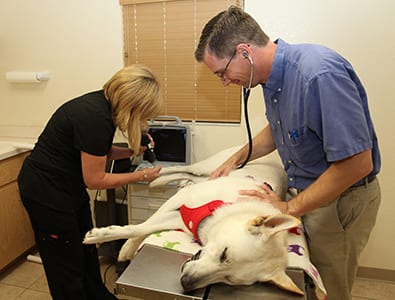Why Spay and Neuter Your Pets?
Spaying and neutering is an important part of responsible pet ownership. We understand the thought of this procedure, like many surgeries, can make pet owners nervous. However, there are many medical, behavioral, and social benefits to pet spay and neuter surgeries.

Health and Behavioral Benefits
Spay and neuter surgery has many positive side effects. Undergoing this common procedure is proven to extend the lives of male and female pets by eliminating the risk of certain illnesses. Additionally, removing the reproductive organs can reduce or eliminate problematic behaviors in pets caused by breeding instincts, like roaming which can lead to loss and/or injury in dogs and cats.
Other behaviors and health risks which are reduced and eliminated include:
Males
- Aggression
- Testicular cancer
- Prostate problems
- Spraying and territorial urination
- Mounting objects and other animals
Females
- Unwanted pregnancy
- Heat cycles and spotting
- Uterine infections, including pyometra
- Breast tumors
- Uterine cancer
Fighting Pet Overpopulation
While there are many individual advantages for pets who are spayed or neutered, there is also a large societal benefit to these surgeries... combating overpopulation. According to the ASPCA, an estimated 6.5 million companion animals are put in U.S. shelters each year. Sadly, many of these animals will not be adopted. By preventing unwanted animal pregnancies through pet spay and neuter surgeries, you can keep the number of strays and shelter animals from increasing, therefore increasing the odds of adoption for animals already in need of a good home.


Proceeding with Spay or Neuter Surgery
We recommend having your pet spayed or neutered after they finish receiving their puppy/kitten vaccinations. In general, this should take place between the ages of four and six months. Dr. O'Sullivan can discuss this procedure at your pet's first wellness exam when you develop their vaccination schedule, since the ideal time to spay or neuter can vary from pet to pet.
As with any surgery, our team runs blood tests and fully examines your pet to determine if they have any medical conditions before operating. Once it is determined a pet can safely undergo surgery, we safely anesthetize them. During the procedure and recovery, we give your pet a continual IV of fluids and medication. They will also have their vital signs monitored at all times. Spay and neuter surgeries are outpatient procedures, so your pet will be able to go home with you once the effects of the anesthesia have worn off. Keep your pet's environment calm for the first 24 hours after surgery, for their comfort. Monitor your pet to ensure they do not lick or scratch at their stitches; pet cones may be necessary.
If you have any questions about pet spay and neuter procedures, or want to set up a consultation, call us at 863-655-3155.
